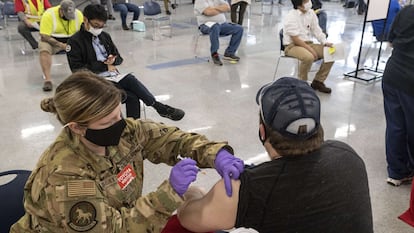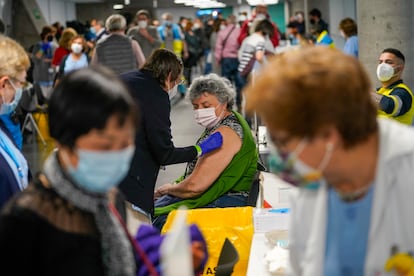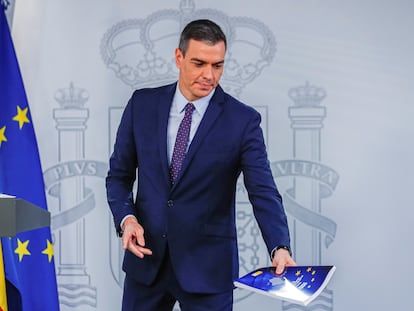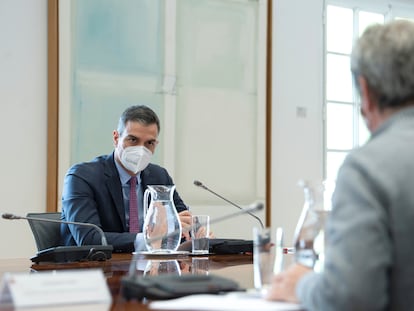Spain’s immunization goals face new challenge as Janssen vaccine put on hold
Although the target of vaccinating 70% of the adult population can still be reached with the other medications, the one-shot dose was set to speed up the rollout


Spain on Wednesday received 146,000 doses of the Janssen vaccine, made by a subsidiary of Johnson & Johnson, but the Spanish Health Ministry said the vials will be kept in storage until the European Medicines Agency (EMA) makes an announcement next week regarding blood clotting concerns.
The move comes after the United States’ federal health authorities recommended use of the Janssen vaccine be suspended while six cases of rare blood clots are investigated. Among those cases, one person died in the US and another is in critical condition, after a total of seven million people were given the inoculation. The decision will have a knock-on effect in Spain, which was due to start using the single-dose vaccine from today onward as part of its vaccination campaign.
The pause comes in the wake of similar events in Europe with the use of the Oxford-AstraZeneca vaccine. As a result of cases of blood clots after use of the latter, Spain has opted to change the target groups for the medication several times.
If this is a stoppage of a few days, it won’t be a problem. But if it drags out, the acceleration of the speed that we were expecting will not come to passJosé Antonio Forcada, from the National Association of Nursing and Vaccines
In a statement that was made public on Tuesday, Johnson & Johnson said: “Out of an abundance of caution, the CDC and FDA have recommended a pause in the use of our vaccine,” adding: “In addition, we have been reviewing these cases with European health authorities. We have made the decision to proactively delay the rollout of our vaccine in Europe.”
The announcement deals a new blow to the already troubled vaccine campaign across the European Union (EU), which is being managed by its executive branch, the European Commission (EC). The EC was due to receive 55 million doses of the Janssen vaccine between April and June.
“Today’s developments with the J&J vaccine in the US are under close monitoring by [the European Medicines Agency] and its pharmacovigilance bodies, with an open line to the [FDA] and other international regulators,” wrote Stella Kyriakides, the European Commissioner for Health and Food Safety, via social media. “EU rollout has been paused by the company. Vaccine safety is always paramount.”
Today’s developments with the J&J vaccine in the US are under close monitoring by @EMA_News and its pharmacovigilance bodies, with an open line to the @US_FDA and other international regulators. EU rollout has been paused by the company.
— Stella Kyriakides (@SKyriakidesEU) April 13, 2021
Vaccine safety is always paramount.
For Spain, the suspension of the vaccine’s use is another spoke in the wheels of the campaign, which is aiming to inoculate 70% of the adult population by the end of the summer. While the doses that are due to arrive in the country of the other vaccines that have been authorized for use – AstraZeneca, Pfizer-BioNTech and Moderna, all two-dose vaccines – are sufficient to reach this target, the fact that Janssen only requires a single injection for the full protection it offers against Covid-19 was going to be a key factor in speeding up the process.
The first group that will be affected are the 70- to 79-year-olds in Spain, who until now had been receiving the Pfizer and Moderna vaccines but from today were due to also get the Janssen. It is, for now, unknown how long the suspension of the medication will last.
The news came as a surprise for the Spanish authorities. The Health Ministry became aware of the development thanks to the press release issued by the manufacturer. The health minister, Carolina Darias, said on Tuesday that her department was “expectant” for news. “The Spanish Medicines and Health Products Agency is in permanent contact with the European Medicines Agency,” she said. “We are ready to receive the vaccine.”
The initial impact of the suspension in Spain, however, will be relatively small. A total of 300,000 doses were due to arrive in the country in April – this is a small number compared to the 2.7 million (including those delivered this week) that have been delivered by Pfizer. The majority of the country’s regions – who are in charge of their own vaccination processes – began vaccinating the 70-79 age group between this week and the last, and 21.4% of those 3.9 million people have already received at least one shot, according to data released on Tuesday.

Problems could arrive in the medium term should the suspension last. Over the current quarter, Spain was due to receive 5.5 million doses of the medication. This, combined with uncertainty over the use of AstraZeneca – not only because it has caused the same side effects in a tiny number of recipients, but also because much fewer doses are being delivered than were promised – is putting all hopes on Pfizer and Moderna meeting their commitments of delivering 63.6 million doses from here to the end of the summer.
With these two vaccines, inoculating 70% of the adult population in summer is within reach: it’s a total of 27.4 million people, who will need fewer than 54 million doses, given that the under-65s who have been diagnosed with Covid-19 in the previous six months will only get one shot. Taking into account the AstraZeneca doses that have already been administered and that continue to arrive, the more ambitious target set out by Spanish Prime Minister Pedro Sánchez of immunizing 33 million people in the summer – which represents 70% of the entire population and not just adults – is also possible.
The first group that will be affected by the suspension are the 70- to 79-year-olds in Spain, who were due to get the Janssen vaccine from today
But these calculations are subject to many uncertain factors. Any new setback could derail the forecasts, and it would not be the first time that the objectives have not been met: no EU country managed to inoculate 80% of its over-80s, as had been set as a target. Now, in mid-April, Spain is close to achieving that objective, with more than half of the age group with the two doses needed for the full protection offered by the vaccine.
All of the numbers now depend on what happens with Janssen. “If this is a stoppage of a few days, it won’t be a problem,” said José Antonio Forcada, from the National Association of Nursing and Vaccines (Anevac). “But if it drags out, the acceleration of the speed that we were expecting will not come to pass.”
As well as the over-70s, the majority of Spain’s regions began this week to vaccinate the 355,000 people with pre-existing conditions that make them vulnerable to Covid-19, such as transplant or cancer patients. This entire group will be receiving the Pfizer or the Moderna vaccines.
English version by Simon Hunter.









































